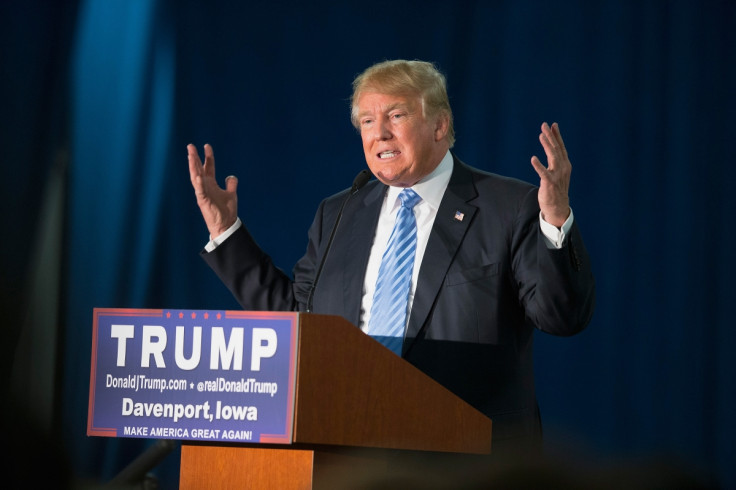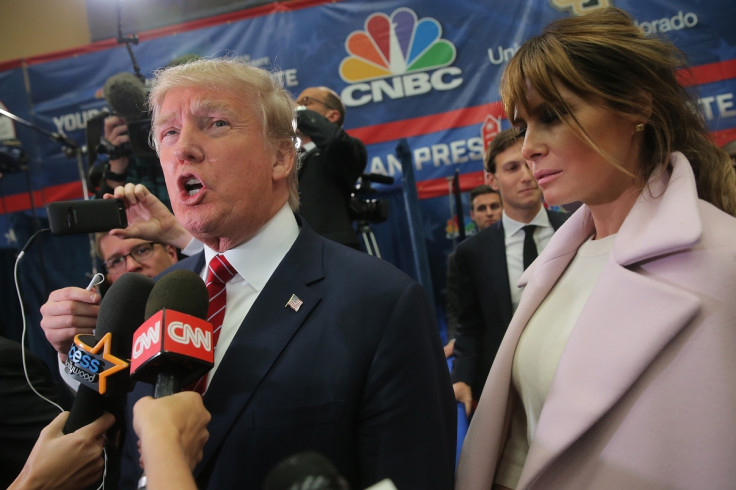Donald Trump: Could America's brash anti-Muslim billionaire be the next US president?

Donald Trump's latest tirade against Muslims has provoked speculation about whether the billionaire celebrity turned presidential candidate has finally gone too far. His call for the US to close its borders to Muslims after the San Bernardino shootings has been roundly condemned – by every one of his contenders as well as Democratic front-runner Hillary Clinton – but it is hardly anything new.
As with the outrage that greeted his claims about former presidential candidate and Vietnam War veteran John McCain ("He's not a war hero. He's a war hero because he was captured? I like people who weren't captured") in July, his anti-Muslim comments will unlikely dent his poll numbers. Trump is currently front-runner for the Republican nomination, polling between 25% and 30% as recently as Monday, with the election still 10 months away.
With the first primary in Iowa in February, 12 weeks from now, there is plenty of time for Trump to lose momentum. In 2008, former New York Mayor Rudy Giuliani led polls ahead of Senator McCain, but his star waned during the primaries. In 2012, Mitt Romney spent very little time at the top of the polls compared to businessman Herman Cain and former Texas governor Rick Perry, but ended up as the candidate against Barack Obama.
Donald Trump has been a celebrity in America since I was in junior high school. He's a phenomenon. He's unique. [If he won] it would be quite unprecedented in the modern period.
So far in 2015, Wisconsin Governor Scott Walker has led the polls, followed by retired neurosurgeon Ben Carson, then Trump, then Senator Ted Cruz and now back to Trump. Senator Marco Rubio's star has risen and fallen, as has former Hewlett-Packard chief executive Carly Fiorina's. Only Jeb Bush, the brother and son of two former presidents, has routinely struggled to achieve positive polling. He may be looking to the Romney example and praying that the party gets behind the Bush dynasty for a third time.
"If you look at the historical pattern of polls, not just in this election, [...] you see that there tends to be this rapid rise followed by a decline," said Joe Twyman, head of political and social research at polling company YouGov. "People benefit from being the new and exciting candidate but the scrutiny that they are subjected to means that they fall back."
Republicans in the US were waiting for Trump's "oops" moment, recalling the 2011 presidential debate when then candidate Rick Perry could not name the three government departments he planned to cut as part of his key strategy. They are still waiting. Trump has insulted war heroes and journalists alongside various Twitter tirades against women, celebrities and now Muslims. And his people love him for it.
David Mark, analyst and co-author of the forthcoming Doubletalk: The Language, Code, and Jargon of a Presidential Election, said that whether or not Trump believes the things that he says on the campaign trail, he has proved how adept he is at staying in the press. His outrageous statements have had the disarming effect of forcing his rivals to respond to him, not the other way around.
"Trump is extremely talented in dominating media coverage," Mark said. "He has been doing this for 30 plus years. He is good at promoting himself. It keeps him in the news and it knocks the other candidates off balance. Rather than Jeb Bush talking about his tax reform plan or Mark Rubio talking about foreign policy and how to combat ISIL, you have them responding to [his] call to keep Muslims out of the US."
Part of the problem is that the Republican establishment Trump has disparaged, both in public and on social media, has failed so far to get behind another candidate. Even in 2012 and 2008, when outsiders enjoyed brief moments in the sun, there was generally a Republican heir presumptive even before the first primary. With more than a dozen candidates in the field as of November, there is no indication of where the GOP will place its bets.
"The Republican Party elite haven't coalesced around any candidate so far. They have certainly rejected him unanimously but you can't beat something with nothing," said David Karol, a political scientist at the University of Maryland and co-author of The Party Decides.

It is early days for Trump. He is currently competing in a wide field where polling 25% or 30% is impressive, but as candidates drop out in difficult primaries in Iowa and New Hampshire, it will remain to be seen who scoops up their share. New Jersey Governor Chris Christie, Rand Paul and Mike Huckabee together make up 10% of Republican voters, polls suggest, and all are likely to drop out early in the race.
"Candidates are weeded out," Karol said. "If they can't do well in Iowa, New Hampshire or South Carolina, then they are through. People stop paying attention, the media stops writing about them, they can't raise any money and the voters don't think they are a real alternative any more. So to win, Trump has to increase his support."
Many doubt that Trump can do that. Not only has he publicly derided the GOP, but he is also not even a traditional Republican. He supports Medicare and is opposed to the privatisation of social security. He is bombastic and brash, loud-mouthed and unorthodox. Far from being part of a political dynasty like George W Bush, he is an outsider. He even once donated money to Hillary Clinton's campaign. He has the benefit of being a billionaire and not having to worry about financing, but can that be enough?
"The poll averages point to Trump having a sizeable lead and it does seem that the things he keeps saying don't dent that, but can he then survive as the others drop out? He doesn't need the money but he may well need the machinery and nous of the Republican machine – a machine which he publicly despises," Twyman said.
To a certain extent, it is to those things that Trump is pitching. Like Britain's Labour Party under Jeremy Corbyn, the emphasis has been on a "new" politics, an end to the control of traditional elites, whether Blairite or the southern gentleman network of the GOP. When the Tea Party fell by the wayside after Obama's second term, many thought it dead and gone, but Trump has filled that void.
"It is fascinating if you can look at it in the cold light of day because while we've had people before who played to racial fears and were populist, he is also this huge media figure. It is really something to watch. Donald Trump has been a celebrity in America since I was in junior high school. He's a phenomenon. He's unique. [If he won the primaries] it would be quite unprecedented in the modern period," Karol said.
The question remains, how far can Trump go? He already has more money and a better profile than most if not all of his rivals, and if he can secure the votes to the primaries then there is nothing that the GOP could do legally to stop him becoming the nominee. All he has to do is make it through the early primaries and pick up the votes as his rivals drop out. "I don't think it is too much to think that Trump could be the Republican nominee. I still don't think it is likely but [...] you'd be foolish to say he was a sideshow," Mark said.
Which raises the question of how Trump would fare in a general election against Clinton, the presumed Democratic candidate for president. Unlike the other Republican candidates, Trump has name recognition to rival the Clinton name in the US, even if he is not as well known in the UK. But Republicans who are behind Trump – and the GOP establishment that is yet to find a rival to beat him – should be wary, Karol said.
"I think a lot of Republican voters don't actually get this. In surveys, when people are asked: 'Who is the most electable candidate?' People say Trump. This is where the Republican elite have to do a better job of explaining to voters that if they want to beat Hillary, this is not the way to go."
© Copyright IBTimes 2025. All rights reserved.





















